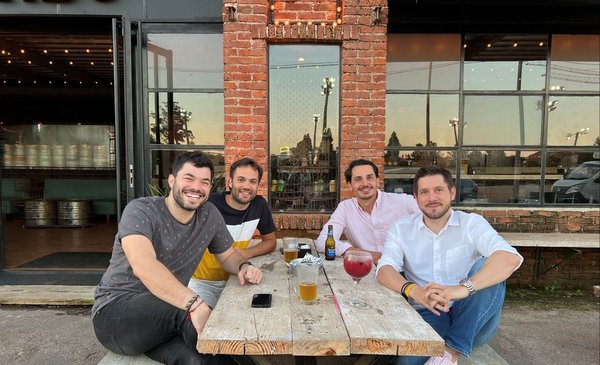It was 2020 —the year the pandemic began in Uruguay—, when Martín Ciappesoni and Marcelo Sosa talked about the concern that formed your own company. “We were aligned on the values and from that we began to shape the processes and we defined where we wanted to go,” said Ciappesoni in dialogue with Coffee & Business. ANDThese talks led to the creation of a website. And so Nooka Labs was born.
Although the technological started as a ecommerceDue to the health situation at that time, the startup it was diversifying and added two extra business lines: custom software development and data engineering. little by little The partners linked to the venture were growing, as well as the workforce. Ciappesoni and Sosa were joined by Carlos Poladura, who at that time had 15 years of experience in online stores. Finally, Jeronimo Acosta arrived to contribute to the expansion of the company, as he had already done with other companies. startups.
According to the company’s annual reports (income), for 2021 the income of the startup they had grown 95% and, during 2022, this indicator stood at 225%.
The consolidation of Nooka Labs led the company to focus more and more on the data area until the services were complete: from the extraction, to the debugging, selection, systematization and presentation of the data, a process focused on that companies can take more efficient business decisions.
Thanks to this business vertical, the Uruguayan technology company managed to reach the US market and stand out in the data niche. That was how the American company phDatafounded in 2014 with the purpose of managing problems in the analysis and business data of organizations through platforms and cloud technology, He set his eyes on the Uruguayan and bought it.
Although the partners preferred not to talk about figures, they expressed that phData sought with the incorporation of Nooka Labs landing in Latin America, and consolidating Uruguay as the third headquarters of the company and operations center for the entire continentafter its headquarters in the United States and another in India.
During the negotiations, “we presented Uruguay as a hub of innovation —Ciappesoni pointed out, “where The institutional, social and economic stability of the country was essential for them to decide to bet on us to settle in the region“.
The local technology company has now joined phData, although it will continue to be led by the four Uruguayan partners. Entrepreneurs are challenged to grow the workforce to 200 three years from now between data engineers (data engineers), solution architects (software solution architects) and data scientists (data scientists).
Parallel, The American technology company expects to invest US$ 5 million also in that periodwith the aim of developing and expanding in Latin America, so one of the focuses of its investment will be in training and learning new data technologies.
In this sense, From Uruguay, they aim to contract mainly in Argentina, Brazil and Colombia with completely remote modalities. In Acosta’s terms, US company seeks to “empower” local entrepreneurs and boost the business.
Among other goals, Uruguayans hope to “modernize in Latin America” the data nicheCiappesoni said. In this sense, the now director, PMO & Managed Services of phData for Latin America spoke of “evangelizing the continent” in terms of knowledge of the technology promoted by various specific platforms, such as snowflakean American data storage company that relies on cloud computing. This company is also partner (or business partner) of phDataand that works with global corporations, such as the financial mastercard or the luxury car manufacturer Porsche.
The partners with whom you spoke Coffee & Business They reinforced the idea that “data is the new oil” and called on young people to train and retrain in this area of technology. “It is a place where demand considerably exceeds supply and it is a good opportunity to work,” he concluded. Ciappesoni.


















